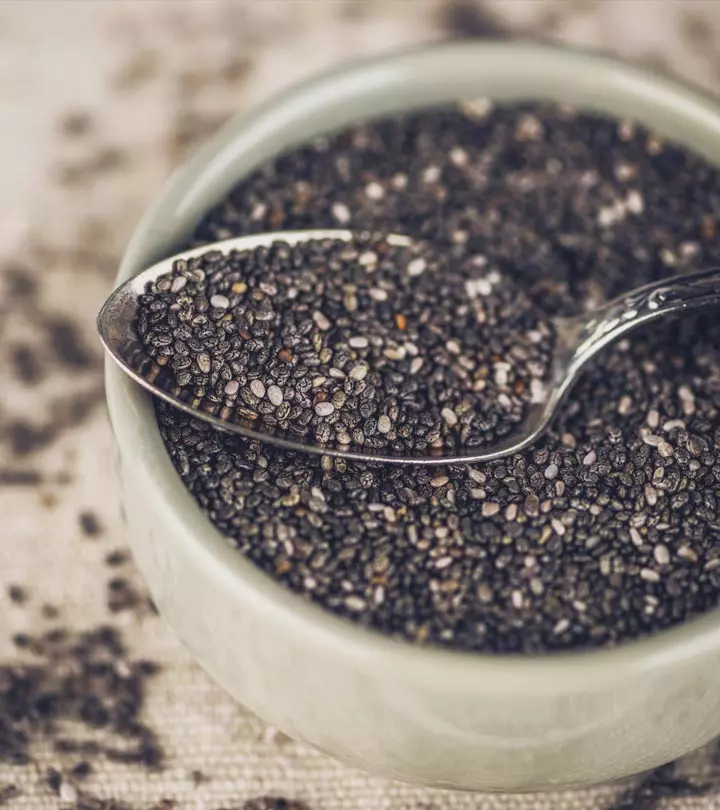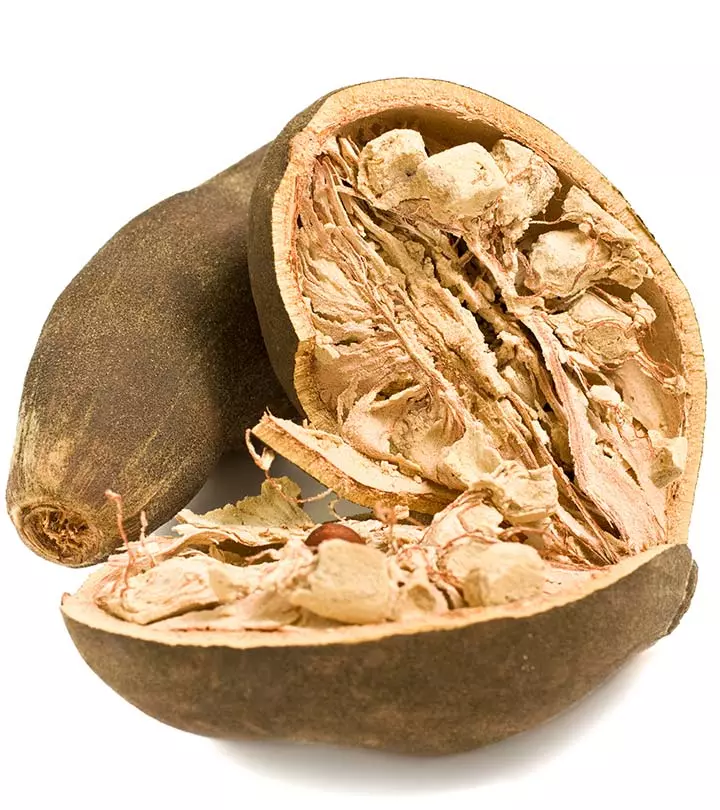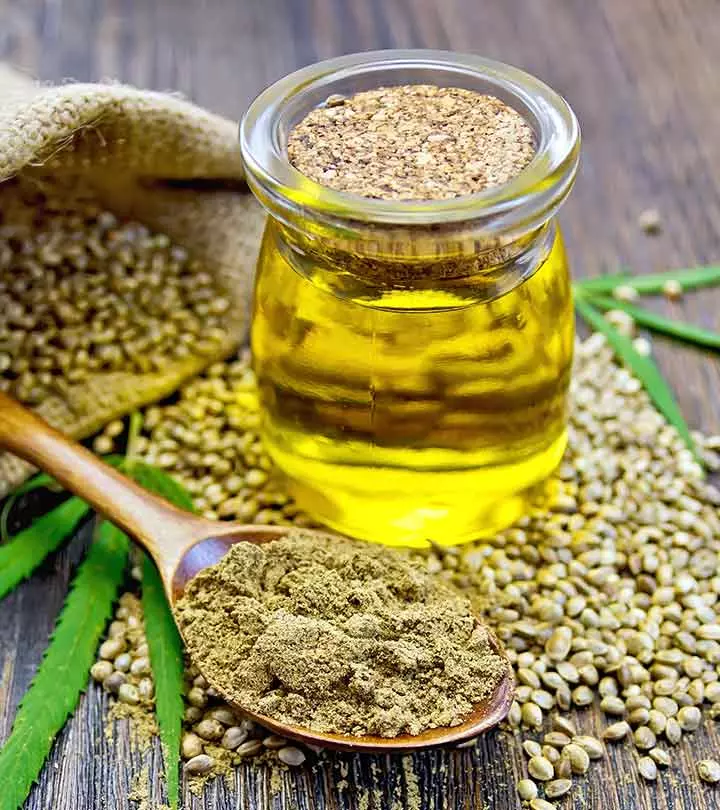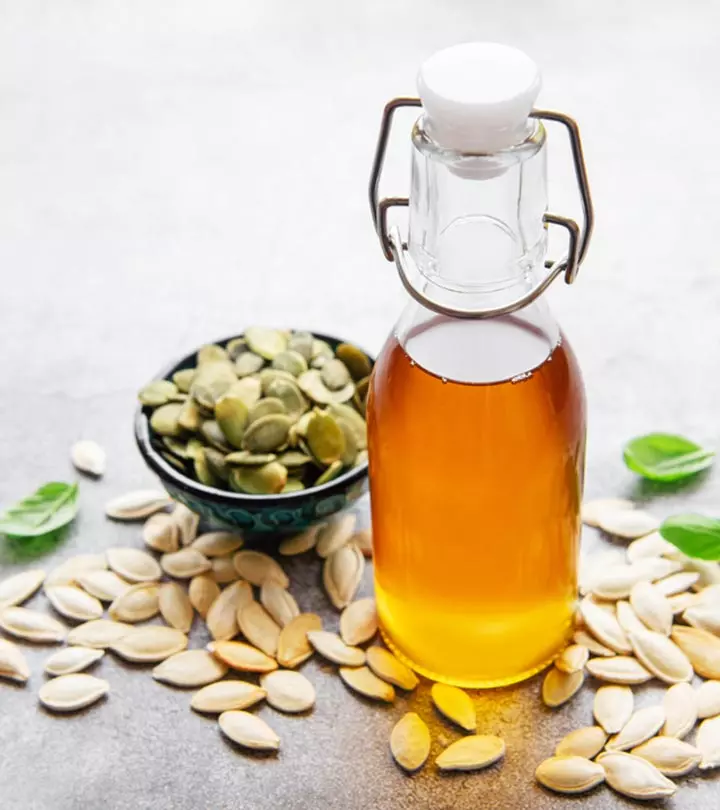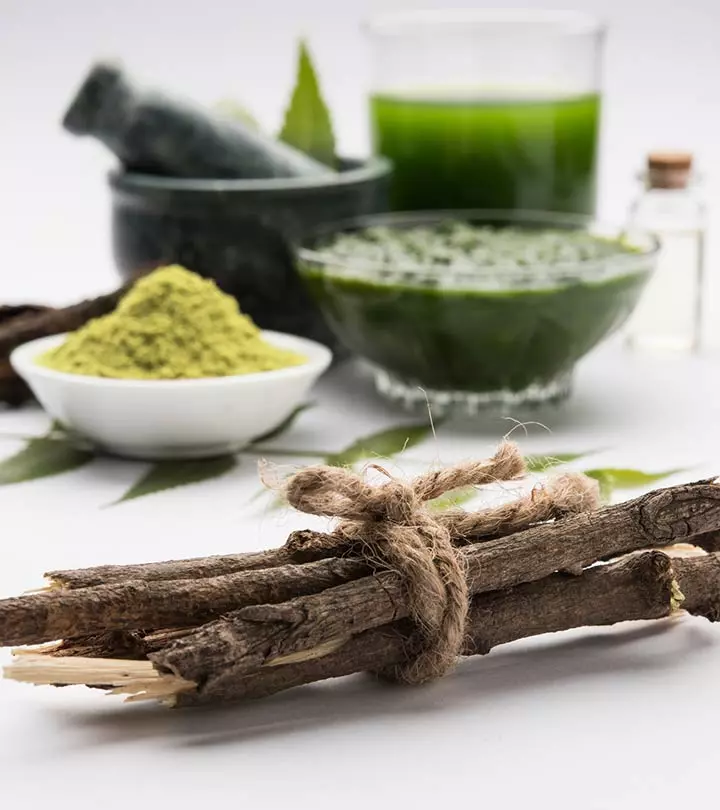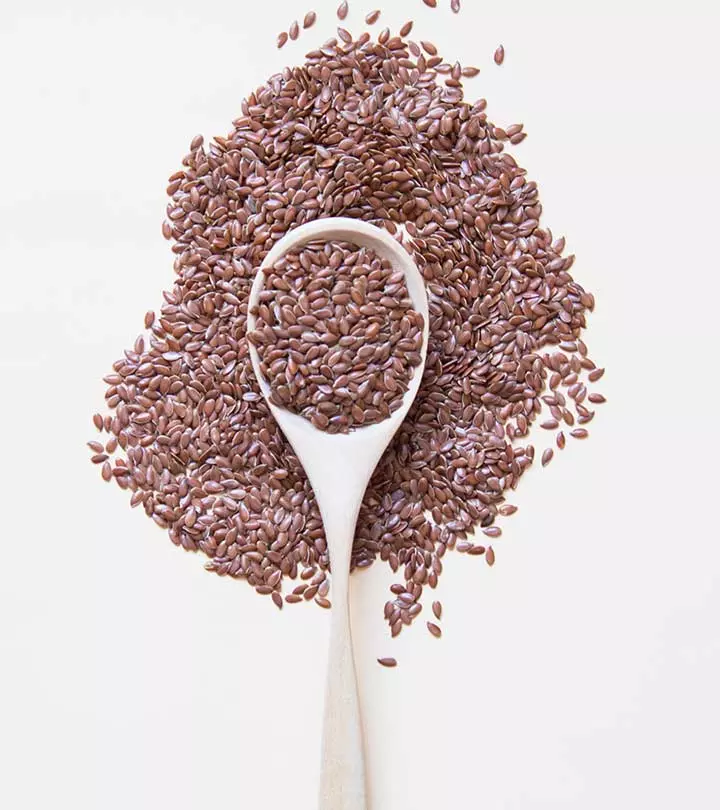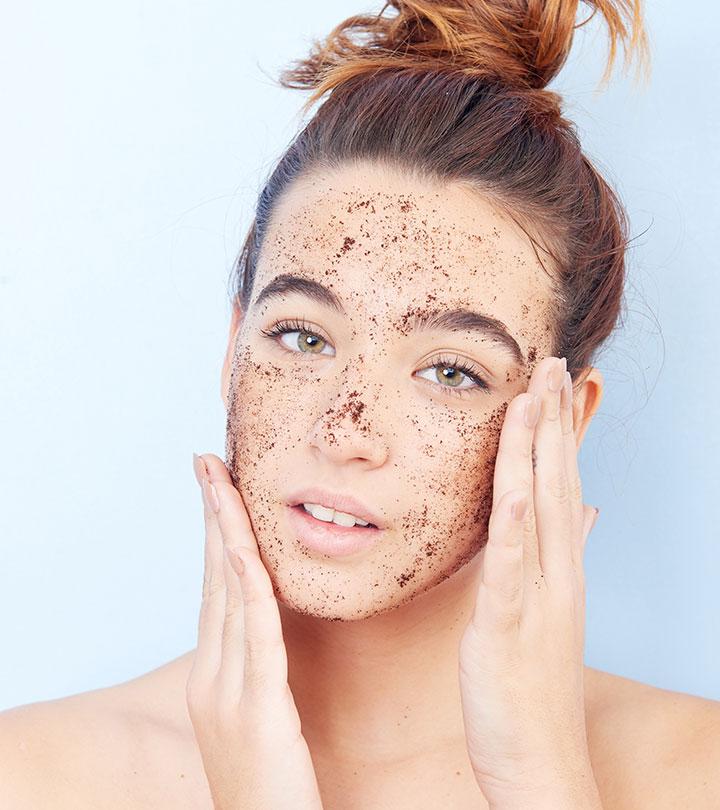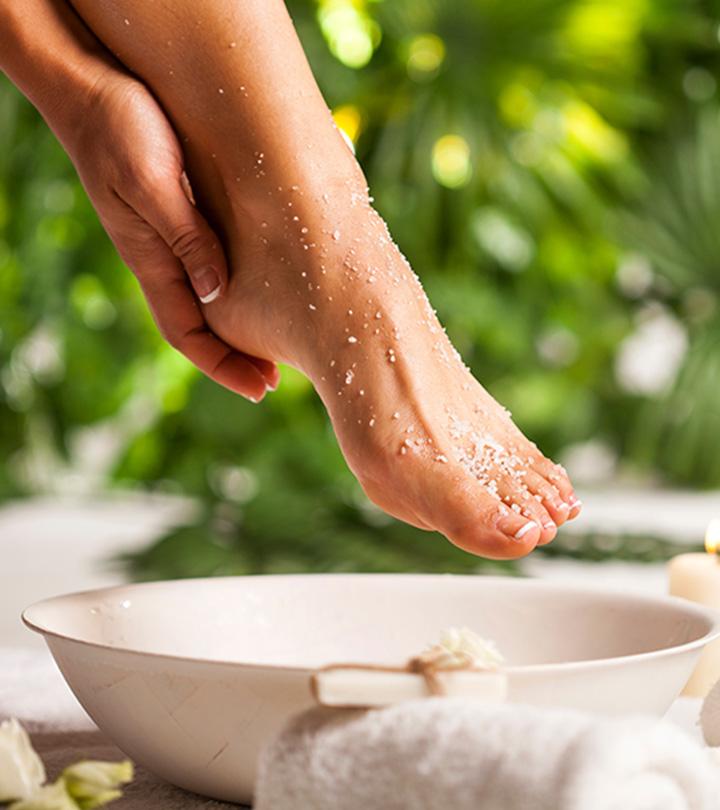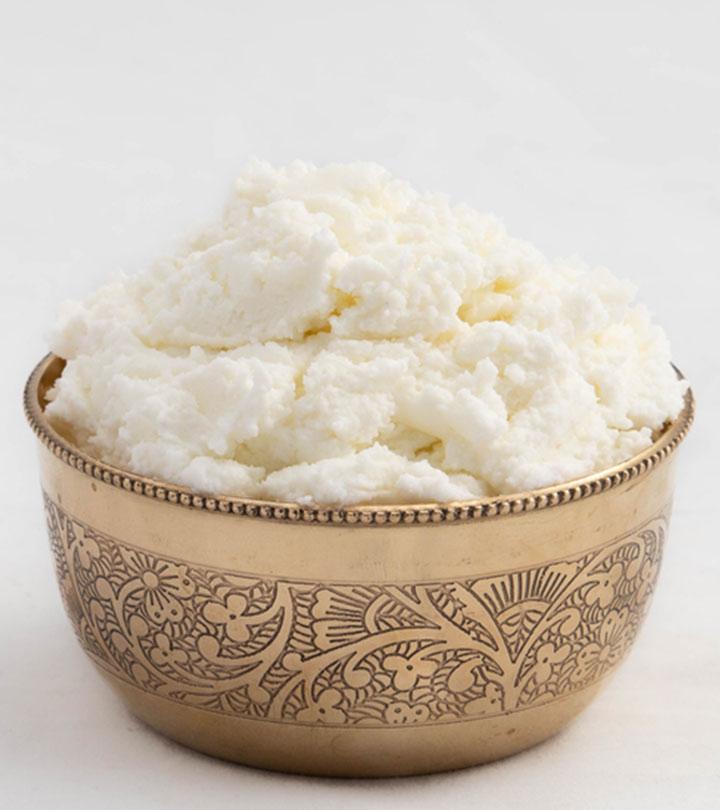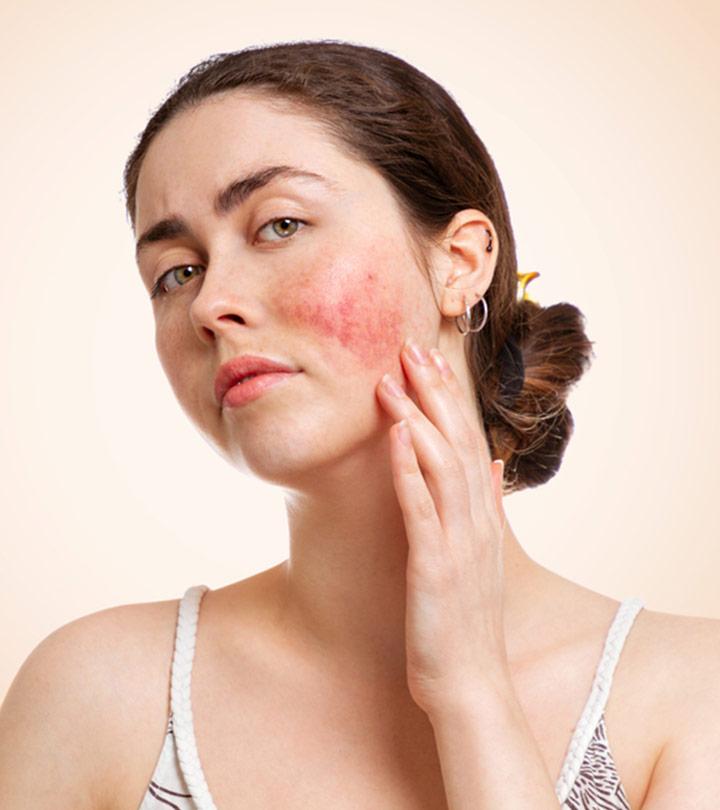Chia Seed Oil For Skin: Benefits, Uses, And Side Effects
Move over smoothies and learn the skin care benefits of using the oil from chia seeds.
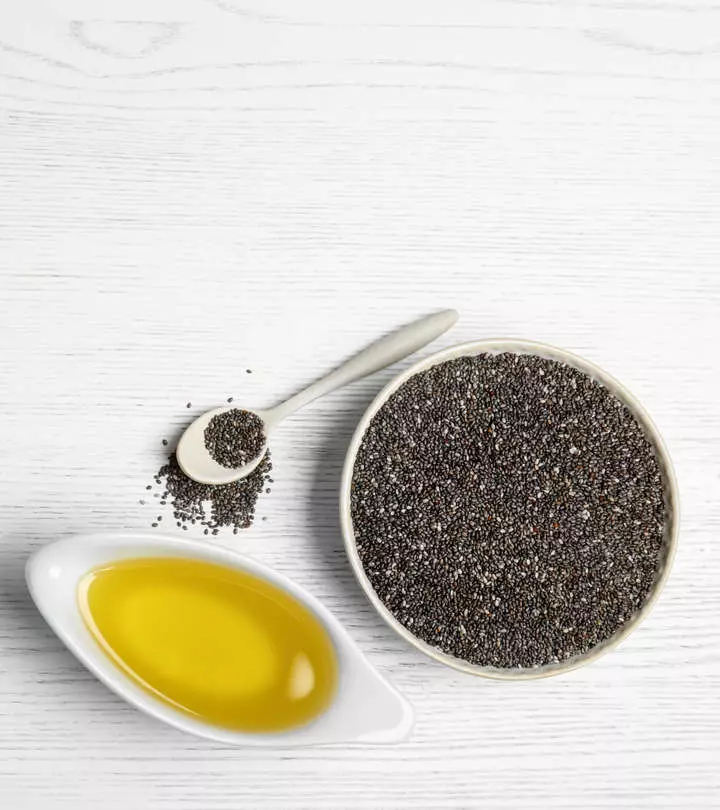
Image: Shutterstock
There was a time when fitness enthusiasts and influencers were busy endorsing chia seed shakes and puddings on social media. And now, the current hype is around using chia seed oil for skin care woes.
But does chia seed oil have any benefit on your skin? Is it worth the hype? This article will answer all your queries about chia seed oil and how to use it. Keep reading.
In This Article
What Is Chia Seed Oil?
Chia seed oil is the plant-based oil extracted from chia seeds. The oil is light, neutral, and has no fragrance. It is stable and non-greasy. The seeds and their oil are loaded with antioxidants, polyphenols, vitamins, minerals, dietary fibers, and healthy fats (1).
 Trivia
TriviaChia seed oil has been gaining popularity for its skin benefits. But how does it work on your skin?
How Can Chia Seed Oil Benefit Your Skin?
You can apply chia seed oil topically or make it a part of your diet to derive its cosmetic gains. Here’s how it can benefit your skin.
1. May Prevent Premature Skin Aging
The healthy fats in chia seed oil make it the go-to ingredient for skin care products and remedies. The seed oil is rich in omega-3 fatty acids, like alpha-linolenic acid, and omega-6 fatty acids, like linoleic acid. It also contains other healthy fats like oleic and stearic acids . It also contains other healthy fats like oleic and stearic acids (1). It also contains vitamin A which promotes skin health.
The antioxidants in chia seed oil may also reverse the signs of premature aging and reduce the appearance of fine lines and wrinkles. However, more research is warranted in this regard.
2. May Deeply Moisturize Dry Skin
The skin membrane requires a rich and dense layer of lipids to seal moisture and stay hydrated. The chia seed oil supplies these healthy fats to the skin that are believed to act as effective emollients. They may restore the skin moisture barrier and make it plumper. Additionally, chia seed oil may also slow down the transepidermal water loss and boost skin hydration (2).
In studies, chia seed oil was found to moisturize skin and relieve skin itching (3).
In studies, chia seed oil was found to moisturize skin and relieve skin itching (3).
For best results, apply chia seed oil immediately after a shower. This will help seal skin moisture and allow it to penetrate the skin.
3. May Protect Against Free Radical Damage
Chia seed oil is loaded with powerful antioxidants like caffeic acid, myricetin, quercetin, and rosmarinic acid (1). These bioactive ingredients may neutralize free radicals and protect the skin from oxidative stress. Chia seed oil may also offer protection against environmental aggressors like UVA and UVB radiation and pollution.
4. May Relieve Skin Inflammation
Chia seed oil could be ideal if you constantly struggle with skin inflammation. Its moisturizing properties may help.
In a study, individuals dealing with significant skin issues showed improvements in their skin condition with chia seed oil. They experienced reduced skin irritation and perceived itchiness. This could be attributed to the anti-inflammatory properties of the omega-3 fatty acids in chia seed oil (3).
Chia seed oil contains linoleic acid. Studies show that this acid may help relieve the symptoms of atopic dermatitis which is characterized by skin inflammation (4). Chia seed oil is also non-comedogenic – and you may apply it to acne-prone skin without worrying about breakouts.
5. May Combat Sun Damage
The potent natural remedy can also help combat sun damage. The oil is rich in antioxidants and omega-3 fatty acids that may protect the skin against ultraviolet radiation present in sunlight and thus prevent possible sun damage (5). Related to sun damage, the oil may also prevent photosensitive disorder and photoaging.
With so many benefits of chia seed oil for skin care, one may be excited about using it in their routine. While you can use chia seed oil as is, here are a few DIY chia seed face masks and serum ideas that can get you started.
DIY Face Masks And Serums Using Chia Seed Oil
- Revitalizing Lemon, Chia, And Coconut Oil Face Mask
A combination of chia and coconut oil can deeply moisturize your skin, while the lemon adds a refreshing twist. This face mask can lighten your skin complexion and make it feel fresh and youthful.
Ingredients
- 2 tablespoons of chia seed oil
- 2 tablespoons of coconut oil
- 1 tablespoon of lemon juice
Procedure
- Combine all the ingredients in a bowl.
- Apply a thin layer of the face mask to your face and neck.
- Let it sit for about 15 to 20 minutes.
- Gently massage your skin with your fingertips in a circular motion.
- Rinse the residue off with lukewarm water.
- Detoxifying Chia And Green Clay Face Mask
French clay can clear your skin by dislodging any dirt, debris, or residue from your pores. The chia seed oil can counter the drying effects of the clay mask by hydrating your skin. Its potency to moisturize your skin increases with the use of aloe vera gel. This face mask will pamper your skin and keep it soft.
Ingredients
- 2 tablespoons of French green clay
- 1 tablespoon of chia seed oil
- 1 tablespoon of aloe vera gel
- Water, as needed
Procedure
- Mix the French green clay, chia seed oil, and aloe vera gel in a bowl. Add water little by little to form a creamy, well-blended paste.
- Apply a generous layer of this face mask to your face and neck. Let it sit for about 30 minutes.
- Rinse the mask off with some cool water and pat your skin dry.
- Hydrating Chia Seed Oil Serum
This hydrating serum cum face mist can freshen and hydrate your skin in a short time. Store it in a spray bottle and spritz it on whenever the need arises. You can even add essential oils of your choice to modify this recipe to suit your preferences.
Ingredients
- 3 tablespoons of chia seed oil
- 1 vitamin E capsule
- 2 tablespoons of aloe vera gel
- ½ a cup of glycerin or rose water
- A few drops of your favorite essential oil
Procedure
- Transfer all the ingredients to a spray bottle and shake until it forms a colloid.
- Spray a few pumps of the serum on your skin.
Who Can Use Chia Seed Oil For Skin?
Chia seed oil works well on all skin types. It is non-comedogenic, and its topical application has proven to be the most effective on dry and combination skin types.
Anybody can use chia seed oil for its skin benefits. However, ensure that you purchase food-grade oil for consumption or cosmetic chia seed oil specially formulated for direct skin application. Cold-pressed and organic variants are healthier as the antioxidants would not have been denatured by heat treatment. Purchase from a reliable supplier so that you are less likely to experience any side effects.
 Fun fact
Fun factSide Effects Of Chia Seed Oil
Chia seed oil, when applied to the skin in the form of lotion, is usually considered safe. While oral consumption of the oil is also considered safe, some individuals may experience mild stomach discomfort.
Chia seed allergy, though extremely rare, has also been documented. But you may still ensure you are not allergic to chia seed oil by running a 24-hour patch test on your skin and checking for rashes or inflammation.
Chia seed oil allergy may also manifest as nausea, vomiting, a tingling sensation on the lips or tongue, and diarrhea when taken orally. In either case, immediately stop use and consult your doctor.
Chia seed oil may also interact with diabetes and blood pressure medications. The seeds may lower blood glucose levels and blood pressure and might show drug interactions (6). However, more research is warranted in this regard.
How Often Should You Use Chia Seed Oil On Your Skin?
Given that chia seed oil is well tolerated, you could use it daily in moderate quantities. Chia seed oil may take about six to eight weeks to take effect.
Chia seed oil is a multifunctional ingredient used in various skin care and cosmetic products. Chia seed oil is important for skin care because of its beneficial fats, antioxidants, and other bioactive ingredients. Buy chia seed oil that has been specially prepared for use on the skin if you want to use it for cosmetic purposes. Similarly, for culinary purposes, use food-grade chia seed oil. You should notice visible benefits in your skin health if you use it regularly. So, if you want to give it a try, follow the recipes suggested in the article and use chia seed oil for skin care.
Frequently Asked Questions
Are chia seeds good for skin-brightening?
Yes. Chia seeds are rich in iron, potassium, vitamin A, and vitamin C, which help boost skin glow.
Does chia seed oil clog pores?
Yes. Chia seed oil can be comedogenic or pore-clogging for those with oily skin.
Can chia seed oil help with acne?
Yes. Chia seed oil can diminish the appearance of a breakout by reducing redness, fighting the infection, and stabilizing oil levels. However, it may aggravate acne in those with oily skin. Consult your dermatologist for more information.
Are chia seeds good for pigmentation?
Yes. Chia seeds are rich in vitamin E and fatty acids that help fade dark spots and reverse UV damage.
Key Takeaways
- Chia seed oil contains skin-friendly fats like omega-3 and omega-6 fatty acids.
- These fats strengthen the skin’s barrier function and reduce water loss; hence, the skin stays moisturized and hydrated.
- The oil’s rich antioxidant profile reduces free radical damage and shields against UV radiation and pollution.
- It is non-comedogenic and works best on dry and combination skin types.
This video about chia seed oil explores its miraculous hair and beauty benefits for women. From anti-inflammatory properties for blemish-free skin to improved cuticles, check this video to learn more about the many wellness benefits of this oil.
References
Articles on StyleCraze are backed by verified information from peer-reviewed and academic research papers, reputed organizations, research institutions, and medical associations to ensure accuracy and relevance. Read our editorial policy to learn more.
- Chia Seeds (Salvia Hispanica L.): An Overview—Phytochemical Profile Isolation Methods and Application
https://www.ncbi.nlm.nih.gov/pmc/articles/PMC6994964/ - Nutritional and therapeutic perspectives of Chia (Salvia hispanica L.): a review
https://www.ncbi.nlm.nih.gov/labs/pmc/articles/PMC4926888/ - Effectiveness of Topical Chia Seed Oil on Pruritus of End-stage Renal Disease (ESRD) Patients and Healthy Volunteers
https://www.ncbi.nlm.nih.gov/pmc/articles/PMC2883415/ - Comparison of linoleic acid-containing water-in-oil emulsion with urea-containing water-in-oil emulsion in the treatment of atopic dermatitis: a randomized clinical trial
https://www.ncbi.nlm.nih.gov/pmc/articles/PMC5759849/ - Omega-3 polyunsaturated fatty acids: photoprotective macronutrients
https://onlinelibrary.wiley.com/doi/full/10.1111/j.1600-0625.2011.01294.x - Supplementation of conventional therapy with the novel grain Salba (Salvia hispanica L.) improves major and emerging cardiovascular risk factors in type 2 diabetes: results of a randomized controlled trial
https://pubmed.ncbi.nlm.nih.gov/17686832/
Read full bio of Dr. Sreekar Harinatha
Read full bio of Ramona Sinha
Read full bio of Swathi E





